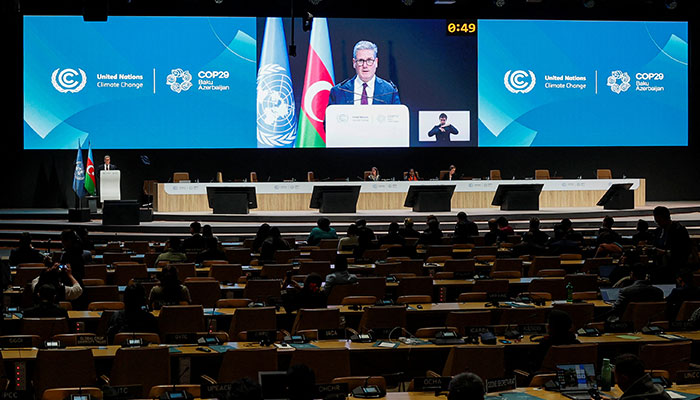
BAKU: Climate change remains a source of concern and contention for countries around the world who are now fighting over climate finance regarding the phenomenon that affects people around the world.
Leaders and representatives from nearly 200 countries gathered in Baku, Azerbaijan for the United Nations COP29 climate summit with the aim of reaching an agreement that would secure up to trillions of dollars in financing for climate projects around the world.
Here’s what you need to know about the COP29 summit talks on finance.
the goal
In 2009, rich countries pledged to contribute $100 billion annually to help developing countries meet the costs of transitioning to clean energy and adapt to the conditions of an increasingly warming world.
These payments began in 2020 but were not fully met until 2022. The $100 billion pledge expires this year.
The countries are negotiating a higher target for payments starting next year, but some are reluctant to confirm its size until it is clear which countries will contribute.
Instead, they revolve around the idea of a multi-layered target, with a core amount coming from the coffers of rich countries’ governments, and a larger amount including financing from other sources such as multilateral lending institutions or private investors.
In the past, public funds made up the bulk of contributions to achieving the $100 billion goal.
Contributors
Donald Trump’s US election victory has cast a shadow over the COP29 talks, due to expectations that he will halt US contributions to climate finance.
This would leave a gap in any new global target that other donors might find difficult to fill. Some climate negotiators also expect the overall target agreed at COP29 to be smaller, given the expected shortfall in contributions from the world’s largest economy.
The United States provided nearly $10 billion in international financing to combat climate change last year, less than the European Union’s contribution of $31 billion.
So far, only a few dozen rich countries have committed to paying UN climate finance, and these countries want fast-growing countries, such as China and the Gulf oil states, to start paying as well.
Beijing opposes this, saying that as a developing country, it does not bear the same responsibility as long-standing industrialized countries such as Britain and the United States.
While China is already investing hundreds of billions of dollars in electric vehicles and renewable energy abroad, it does so on its own terms.
Any agreement on COP29 will need unanimous approval.
Financing needs
Developing countries say the specific amount needed to address climate change should be the starting point for negotiations to ensure the end goal adequately covers their needs.
By most estimates, developing countries need more than $1 trillion to open new doors annually to achieve their climate goals and protect their societies from extreme weather.
Many countries have come to the Baku talks with a number of them in mind. Arab countries, including Saudi Arabia, want a funding target of $1.1 trillion annually, including $441 billion directly from developed country governments in the form of grants.
India, African nations and small island states have also said more than $1 trillion should be raised annually, but with differing views on how much should come from rich governments.
The rich countries expected to provide funds did not specify the target amount, although the United States and the European Union agreed that the amount should be more than the previous target of $100 billion.
Some developed country diplomats say that with other economic pressures on national budgets, a significant increase of more than $100 billion is unrealistic.
What’s at stake?
Climate change has accelerated. Human activities – especially the burning of fossil fuels – have caused the planet’s long-term average temperature to rise by about 1.3°C, resulting in catastrophic floods, hurricanes, and extreme heatwaves.
Countries’ plans to cut emissions are not enough to slow climate change, but will instead make temperatures rise much worse.
Scientists say a UN deadline set next year for countries to update their national climate plans is the last chance to avoid disaster.
Negotiators said failure at COP29 to reach a major financing agreement could lead to countries submitting weak climate plans on the basis that they cannot afford to implement more ambitious plans.
Most global climate-friendly spending has so far been directed toward major economies such as China and the United States. Africa’s 54 countries have received only 2% of global investments in renewable energy over the past two decades.
